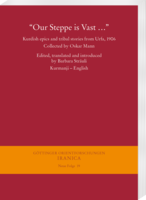|
|
Download:
Please note: With adding digital Products to your cart
the payment will be handled via PayPal. The download will be provided after the payment is confirmed. In 1906 two Kurdish singers from Urfa, Sheikh Bozan and Ayib Agha Temir, dictated epics and stories from their repertoire to the German scholar Oskar Mann. The fourteen pieces, rediscovered in the Berlin-Brandenburg Academy of Humanities and Sciences, are presented here for the first time in a bilingual historical edition.
Half of the texts deal with the history of Kurdish Milan confederation and its leaders, especially with Ibrahim Pasha Milli (1843–1908). They include a hitherto unknown beautiful lament from the 1840s by the wife of the Milan leader who fell in battle. The second half are mostly well-known epics, among them a surprising first variant of “Dewresh, son of Evdi”, two examples of “Mem and Zin” and the earliest long version of “Siyamed (Siyabend and Xece)” to be recorded. Mann’s collection is the lost sibling of the two canonical collections by Albert v. Le Coq (1903) and Hugo Makas (1900/1926). All three are from the same decade and document the literature of the Kurdish tribes of the Kurdish Southwest. Difficult passages in the texts were unraveled in cooperation with members of the Berazi confederation to which the singer Sheikh Bozan belonged. Their comments are included in the introduction and footnotes, together with detailed background information. The introduction deals, among other things, with the concept of history shaping these texts, typical of an oral society, and with the local network of singers and the transmission of epics between Urfa and Afrin. The edition includes photographs, a glossary and an index of names and places. |
|||||||||||||||||||||||||||||||||||||||||||






